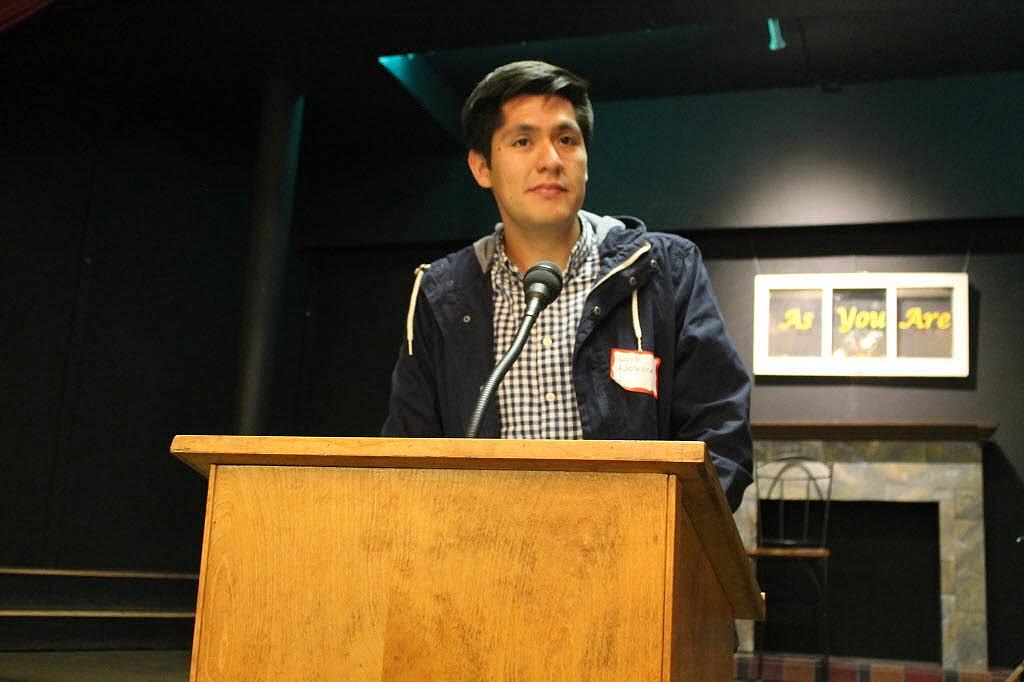Do Latinos have the necessary resources to treat their mental illnesses?
This article was produced as a series on “Reporting on Stigma and Mental Health Needs in California’s Latino communities” for the USC Center for Health Journalism’s California Fellowship.
Other stories in the series include:
Mental illness and stigma in the Latino community

Luis Nolasco, 25, participates in a Black Lives Matter IE vigil in Riverside on Monday June 13, 2016. (Credit: Terry Pierson/The Press-Enterprise)
CLICK HERE for SPANISH version.
Luis Nolasco, 25, did not know what the psychological consequences would be when he came from Mexico with his family, illegally, at the age of nine.
It seemed that there might not be any until he was in his late teens, in high school, getting ready to apply to the university when he noticed he began to feel sad and pessimistic.
“I did not understand what the trauma of being undocumented was all about until I wanted to apply to the university and wasn’t sure I could due to my immigration status”, Nolasco stated. “For awhile I thought I was going to have to go back to Mexico and then that is when I realized...I was different than everyone else”.
Eight years went by and he continued to notice strange symptoms in his personality.
“Stigma exists, it is real,” he said. “Even though it is getting better and there is more acceptance than ever before, mental illness is still a taboo topic in the Latino community. You are supposed to keep it all to yourself.”
On numerous occasions, Nolasco has attempted to navigate the behavioral health care system and has been frustrated that he has not been able to get the help he needs.
A fighter
Nolasco identifies himself as a queer undocumented immigrant and works as a community organizer. He considers himself fortunate that he has health insurance through his employer.

But he he has found it very difficult to find a therapist who will be able to understand where he is coming from.
“My mental state has been the reason why many of my goals have been put on hold,” he admitted.
One report called “Community-Defined Solutions for Latino Mental Health Care Disparities” published by the UC Davis Center for Reducing Health Disparities, found that Latino patients, in general, have less access to mental health services, are less likely to receive needed care, and are more likely to receive poorer quality care when treated than their anglo counterparts.
Erika Del Carmen Ruiz, 21, is another young adult that identifies herself with the Latino LGBTQ community. She has tried therapy in the past because she suffers from anxiety and panic attacks.
Although she says that by nature she has a nervous personality, she remembers that she had multiple panic attacks per week during her last year of high school in San Bernardino due to life stressors such as her grandmother getting sick. She also was coming to terms that she was not heterosexual which went contrary to the beliefs of her immigrant Catholic family. “Nobody had to tell me that not being heterosexual was a sin”, she said.
It took her awhile to step up and go to therapy. “I knew it was going to be helpful but there is so much stigma both in the U.S. and the Mexican culture,” Ruiz admitted.
According to the National Alliance of Mental Illnesses or NAMI, individuals who identify with the LGBTQ community tend to suffer from what is called “double or dual stigma” which is based on their sexual orientation or gender identity while also dealing with societal bias against mental illnesses. The effects of dual stigma can be harmful especially when someone seeks treatment.
In addition, LGBTQ individuals are almost three times more likely than others to experience a mental health condition such as major depression or generalized anxiety disorder.
At the university, Ruiz was fortunate to find a Latina therapist who helped her control her panic attacks. “Therapy helped me get better. Now I feel that talking to others is much easier,” she said.
While she would like to continue going to therapy because she thinks it is a good resource to have, it is hard because she can afford it due to the limitations in her medical plan.
Latinos tend to avoid seeking help
A recent study published in Health Affairs, “Removing Obstacles To Eliminating Racial and Ethnic Disparities in Behavioral Health Care,” highlights the fact that while the Affordable Health Care Act has expanded access to behavioral health care, many reform initiatives fail to consider research about racial/ethnic minorities.
Margarita Alegría, lead author of the study and professor of psychology in the Department of Psychiatry at Harvard Medical School University, explains that Latinos, especially immigrants, tend to avoid or put off treatment until they find themselves in a crisis or are a danger to themselves or others. Also she emphasized that there is a lack of information available to the public about how evidence-based treatments can be helpful.
“We have seen that immigrants do not make the time to go to therapy due the fact that their first priority is work,” Alegria indicated. “They also delay getting help because they prefer to deal with their problems on their own. But there does comes a time when professional help is needed and they need to know when they have reached that point.”

